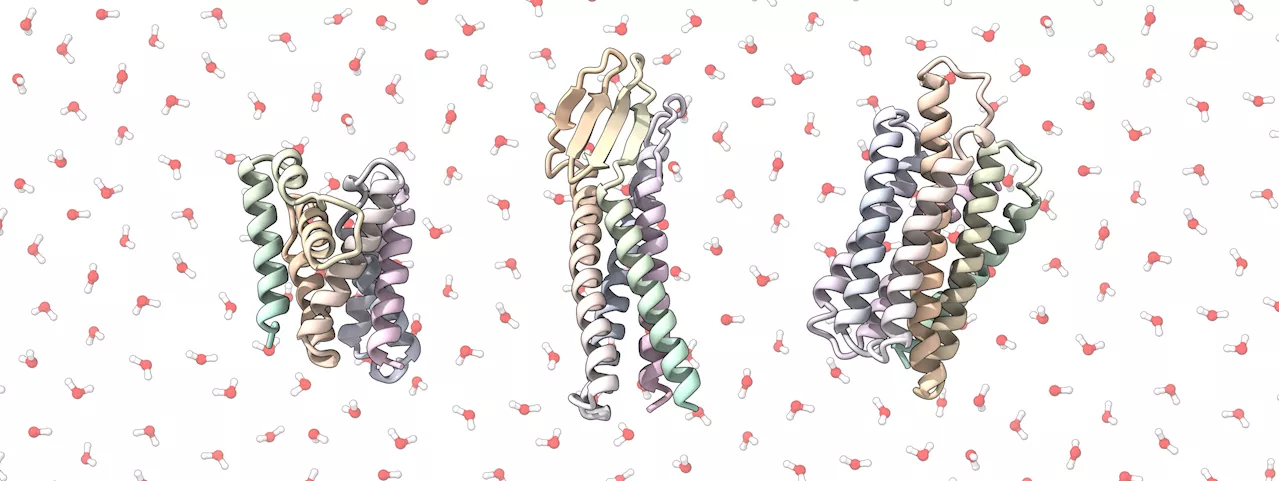Researchers have created a deep learning pipeline for designing soluble analogues of key protein structures used in pharmaceutical development, sidestepping the prohibitive cost of extracting these proteins from cell membranes.
Many drug and antibody discovery pathways focus on intricately folded cell membrane proteins: when molecules of a drug candidate bind to these proteins, like a key going into a lock, they trigger chemical cascades that alter cellular behavior. But because these proteins are embedded in the lipid-containing outer layer of cells, they are tricky to access and insoluble in water-based solutions , making them difficult to study.
In a nutshell, Goverde and a research team in the LPDI, led by Bruno Correia, used deep learning to design synthetic soluble versions of cell membrane proteins commonly used in pharmaceutical research. Whereas traditional screening methods rely on indirectly observing cellular reactions to drug and antibody candidates, or painstakingly extracting small quantities of membrane proteins from mammalian cells, the researchers' computational approach allows them to remove cells from the equation.
To achieve this, the team used the structure prediction platform AlphaFold2 from Google DeepMind to produce amino acid sequences for soluble versions of several key cell membrane proteins, based on their 3D structure. Then, they used a second deep learning network, ProteinMPNN, to optimize those sequences for functional, soluble proteins.
The researchers also see these results as a proof-of-concept for their pipeline's application to vaccine research, and even cancer therapeutics. For example, they designed a soluble analogue of a protein type called a claudin, which plays a role in making tumors resistant to the immune system and chemotherapy.
Pharmaceuticals Pharmacology Vitamin E Organic Chemistry Biochemistry Nature Of Water Fuel Cells
United States Latest News, United States Headlines
Similar News:You can also read news stories similar to this one that we have collected from other news sources.
 Study suggests marine cyanobacteria communicate via membrane nanotubesThree years ago, María del Carmen Muñoz, a researcher at the University of Cordoba, was peering into an electron microscope to study the vesicles of marine cyanobacteria and found, almost accidentally, something she did not expect: structures that, although they had already been discovered years ago in other bacteria, had never been found in this...
Study suggests marine cyanobacteria communicate via membrane nanotubesThree years ago, María del Carmen Muñoz, a researcher at the University of Cordoba, was peering into an electron microscope to study the vesicles of marine cyanobacteria and found, almost accidentally, something she did not expect: structures that, although they had already been discovered years ago in other bacteria, had never been found in this...
Read more »
 Bio-inspired membrane to transform lithium extraction from salt lakesThe method could pave the way for a more viable, longer-lasting solution for lithium extraction.
Bio-inspired membrane to transform lithium extraction from salt lakesThe method could pave the way for a more viable, longer-lasting solution for lithium extraction.
Read more »
 Membrane protein analogs could accelerate drug discoveryMany drug and antibody discovery pathways focus on intricately folded cell membrane proteins: when molecules of a drug candidate bind to these proteins, like a key going into a lock, they trigger chemical cascades that alter cellular behavior.
Membrane protein analogs could accelerate drug discoveryMany drug and antibody discovery pathways focus on intricately folded cell membrane proteins: when molecules of a drug candidate bind to these proteins, like a key going into a lock, they trigger chemical cascades that alter cellular behavior.
Read more »
 Controlling ion transport for a blue energy futureResearchers probed the transit of cations across a nanopore membrane for the generation of osmotic energy. The team controlled the passage of cations across the membrane using a voltage applied to a gate electrode. This control allowed the cation-selective transport to be tuned from essentially zero to complete cation selectivity.
Controlling ion transport for a blue energy futureResearchers probed the transit of cations across a nanopore membrane for the generation of osmotic energy. The team controlled the passage of cations across the membrane using a voltage applied to a gate electrode. This control allowed the cation-selective transport to be tuned from essentially zero to complete cation selectivity.
Read more »
 Detecting odors on the edge: Researchers decipher how insects smell more with lessWhile humans feature a sophisticated sense of smell, insects have a much more basic olfactory system. Yet they depend upon smell to survive. Scientists have figured out how fruit flies use a simple but efficient system to recognize odors, and the answer lies at the edges of their antennae.
Detecting odors on the edge: Researchers decipher how insects smell more with lessWhile humans feature a sophisticated sense of smell, insects have a much more basic olfactory system. Yet they depend upon smell to survive. Scientists have figured out how fruit flies use a simple but efficient system to recognize odors, and the answer lies at the edges of their antennae.
Read more »
 Researchers show taller plant communities are more productive and sensitive to climate warmingClimate warming, a result of increasing greenhouse gas emissions, is causing significant shifts in the composition of plant species with different traits worldwide. These changes are particularly pronounced in colder or higher elevation regions, where their effects are magnified.
Researchers show taller plant communities are more productive and sensitive to climate warmingClimate warming, a result of increasing greenhouse gas emissions, is causing significant shifts in the composition of plant species with different traits worldwide. These changes are particularly pronounced in colder or higher elevation regions, where their effects are magnified.
Read more »
